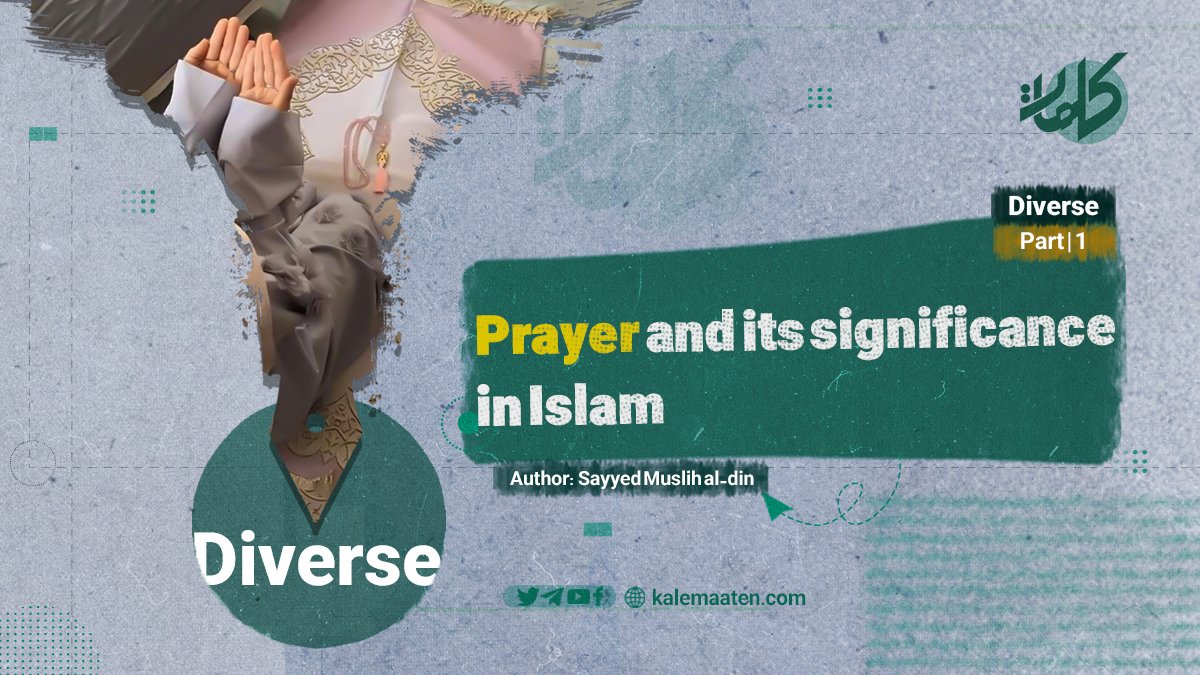
Author: Sayyed Muslih al-din
Prayer and Its Significance in Islam (Part One)
Abstract
Prayer, in the life-giving and human-building school of Islam, holds profound meanings, secrets, and numerous blessed effects. This firm cord connects human existence to the celestial realm. Prayer revives the soul, purifies eternal life, illuminates the path for seekers, supports travelers, provides solace for the mystics, serves as a treasure for the needy, cures incurable pains, enlightens awakened hearts, and brings joy to the early risers. It is the first obligation introduced in Islam and remains the final duty upon humans until their last moments in life, never to be abandoned. Its significance is evident from the words of the noble Prophet (peace and blessings be upon him): “Prayer is the light of my eyes and my beloved and desired act.”
With all its virtues and extraordinary, often unique, educational impacts, prayer also holds significant health benefits and healing properties. Its spiritual and psychological comfort, as well as its moral and educational effects on individuals, reflect its beautiful health and therapeutic features.
Prayer serves both as a means for the soul’s elevation and as a cultivator of humility and submission in the worshiper, taming their rebellious tendencies. It reforms the individual and prevents them from falling into indecency and wrongdoing. Even if a prayer contains only some levels of spiritual depth, it will have an impact to that extent. One of the lesser-explored blessings of prayer is its role in healing mental and physical ailments or reducing the adverse effects of physical and psychological illnesses.
Introduction
The remembrance of Allah is the best means of self-restraint, controlling unruly desires, and preventing the rebellious tendencies of the soul. A “prayerful” person constantly remembers Allah—who is aware of all our minor and major actions, who knows what resides in the depths of our psyche and what passes through our thoughts. The slightest impact of remembering Allah is that it moderates human selfishness and desires, while neglecting Allah and being unaware of His rewards and punishments leads to the dimming of intellect and wisdom.
A person who is heedless of Allah does not consider the consequences of their actions and behaviors and sets no limits to satisfy their unruly desires and instincts. Prayer, however, reminds them of Allah five times a day, clearing the darkness of heedlessness from their soul and spirit.
Indeed, for a human whose instincts dominate their existence, the best way to control these limitless desires and cravings is the remembrance of Allah, the remembrance of the punishments of the wrongdoers, and the precise and infallible accountability of deeds. From this perspective, the Qur’an identifies one of the secrets of prayer as the remembrance of Allah: «وَأَقِمِ الصَّلَاةَ لِذِكْرِي» (And establish prayer for My remembrance.)
Understanding the Relationship Between the Servant (Human) and the Lord (Allah s.w.t):
Comprehending the essence of prayer, the human need for it, and the ability to feel its joy is only possible for those who grasp the extraordinary and unparalleled relationship that exists between the servant and the Lord. This relationship is unique, incomparable, and unlike any bond between two individuals or human beings. It cannot be likened to the connection between a creator and a creation, a ruler and a subject, a powerful and a powerless, a needy and a self-sufficient, a beggar and a generous benefactor. This bond is far more precise, profound, powerful, and encompassing than all these relationships.
Relationships Stem from and Depend on Attributes:
This unique and extraordinary relationship between the servant and the Lord cannot be understood unless one comprehends the attributes of “servant” and “Lord.” Relationships always depend on and arise from attributes. A person cannot define the bond between two individuals unless they understand each individual’s attributes, the differences or superiority between them, and the degree of their mutual dependence.
All relationships encountered in life—legal, civil, and social connections binding communities—are tied to the attributes and characteristics of individuals, beings, family members, or rulers. These are attributes we know or assume to know.
Names and Attributes of Allah (s.w.t) and Their Significance in Religion and the Quran
Before addressing the relationship between the servant and the Lord, inviting to worship, legislating duties, and encouraging obedience, divine scriptures, religions, and doctrines begin by defining the attributes of Allah. In all heavenly religions, matters of belief precede worship, practices, and laws.
Every divine prophet, across different times and places, prioritized the call to proper knowledge and understanding, clarifying divine attributes and inviting to purity and sanctification. Discussions on the attributes of Allah consumed much of their efforts and occupied a significant place in their teachings and writings. They engaged in a profound struggle in this regard.
The Qur’an, as the final and eternal divine book, is the greatest testament to this claim. The topics of divine names, attributes, and beliefs are repeatedly emphasized in various forms throughout the Qur’an, making it the central theme of this miraculous book. Surah Al-Ikhlas, despite its brevity and conciseness, is equated to one-third of the Qur’an because of its clear and powerful articulation of this topic.
In the Qur’an, the attributes and beautiful names of Allah, as well as His wondrous actions and deeds—indicating power, creation, innovation, grace, mercy, love, forgiveness, generosity, punishment, benefit, knowledge, closeness, encompassment, companionship, and acceptance—are mentioned repeatedly. These attributes portray Allah Almighty as the supreme example of beauty, greatness, perfection, and generosity.
«وَلَهُ الْمَثَلُ الْأَعْلَى فِي السَّمَاوَاتِ وَالْأَرْضِ وَهُوَ الْعَزِيزُ الْحَكِيمُ» (“And to Him belongs the highest attribute in the heavens and the earth, and He is the Exalted in Might, the Wise.”)
And they single out the essence of the Almighty in beautiful and good attributes: «لَيْسَ كَمِثْلِهِ شَيْءٌ وَهُوَ السَّمِيعُ البَصِيرُ» (“There is nothing like Him, and He is the All-Hearing, the All-Seeing.”)
Continues…


